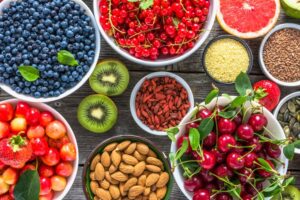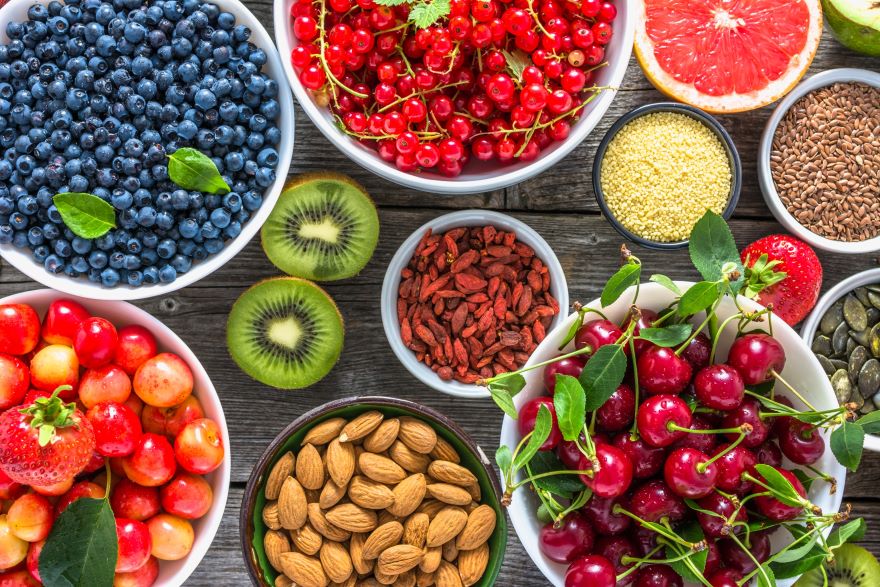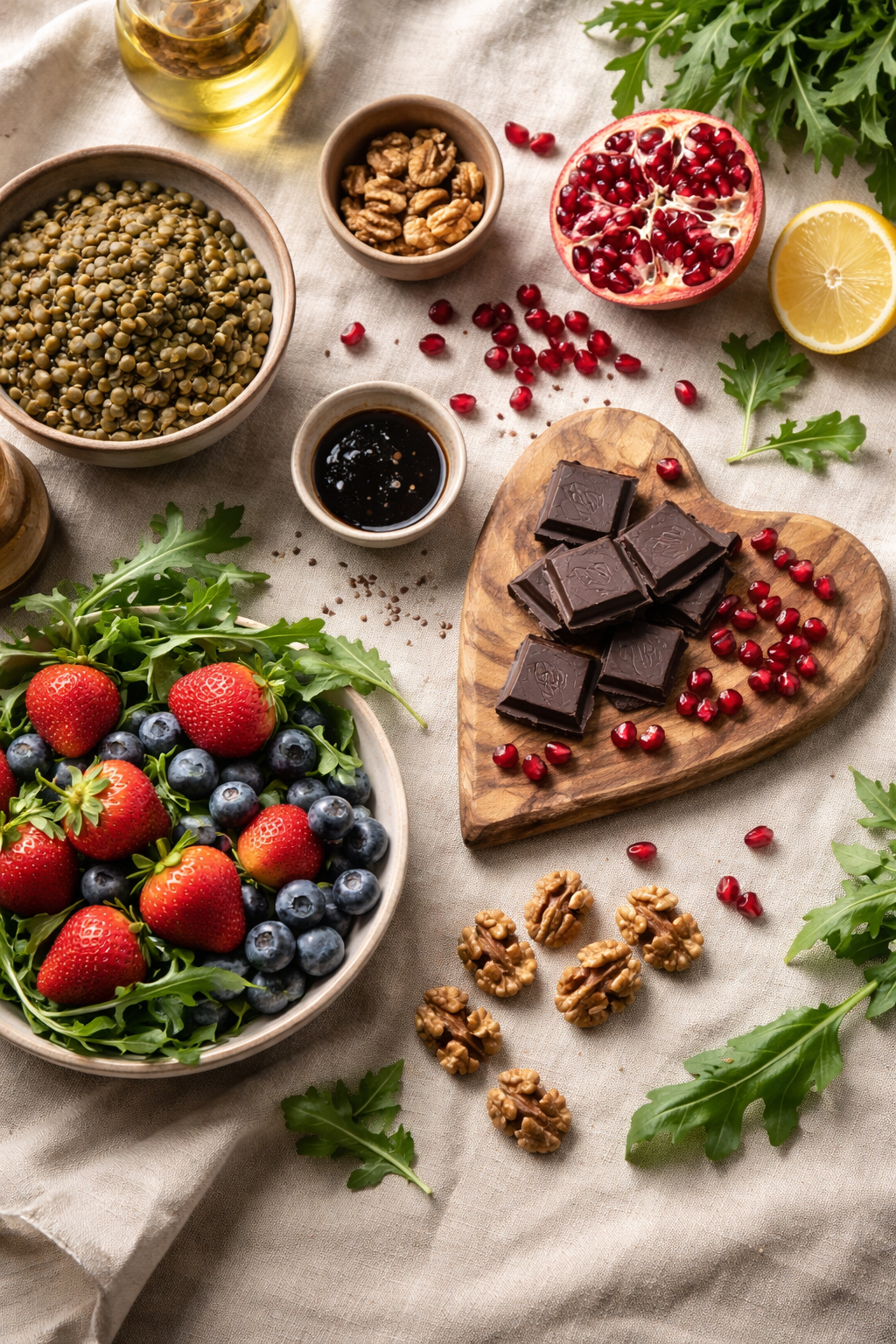I never thought I’d be the one raving about kale and chia seeds, but here I am, completely changed by my adventure into the world of vegan superfoods. Let me tell you about the superfood smoothie disaster that actually turned my life around…
You see, a few months ago, I was a total mess. Stressed out from my job, living on coffee and takeout, and feeling like a zombie most days. My idea of a “healthy meal” was ordering a side salad with my greasy burger. Yeah, I know—not exactly winning any nutrition awards. I was desperate for a change but had no clue where to start. That’s when my annoyingly perky co-worker (you know the type—always glowing and full of energy) started chatting about these things called “superfoods.” I rolled my eyes so hard I nearly saw my brain, but little did I know, her excited babbling about spirulina and goji berries was about to send me tumbling down a rabbit hole that would completely flip my life upside down—in the best way possible.
Key Takeaways
- Vegan superfoods offer numerous health benefits and essential nutrients
- These nutrient-rich foods can be easily integrated into a balanced diet
- Including a variety of superfoods can help vegans maintain optimal health and vitality
The Vegan Superfood Experiment That Started It All

Picture this: me, standing in my kitchen, surrounded by an explosion of colors and textures I’d never seen before. Vibrant purple acai berries were splattered across the counter, dark green spirulina powder had somehow found its way onto my shirt, and a bag of chia seeds had spilled, making my floor look like a weird, healthy version of a slip-and-slide.
I was attempting to create the ultimate vegan superfood concoction, and it was going spectacularly wrong. My blender was making sounds I’m pretty sure blenders shouldn’t make as it struggled with frozen chunks of dragon fruit and tough strips of kale. The pungent smell of maca powder mixed with the earthiness of hemp seeds was making my nose scrunch up in confusion.
As I stood there, covered in various shades of plant-based nutrition, I couldn’t help but laugh at the absurdity of it all. What on earth had possessed me to buy all these weird ingredients? The maca powder that promised energy boosts, the spirulina that supposedly had more protein than steak, the goji berries that claimed to be antioxidant powerhouses—it all seemed so ridiculous at that moment.
But you know what? That chaotic, messy, slightly smelly disaster was the beginning of something amazing. It was my first stumbling step into a world I never knew existed—a world where these nutrient-packed plant superfoods could transform not just my diet but my entire life. Who would’ve guessed that standing there, dripping with green goop and feeling like a total failure, I was actually at the starting line of a wild journey that would completely rewire how I thought about food, health, and myself?
My Vegan Superfood Journey Begins
So, why did I even attempt that first superfood smoothie? Well, I was feeling pretty lousy. Always tired, dealing with mood swings, and just not feeling like myself. I knew something had to change, but I had no idea where to start.
That’s when a friend mentioned vegan superfoods. I’ll be honest, I rolled my eyes at first. It sounded like another fad diet, and I’d been down that road before. But curiosity got the best of me, and I decided to give it a shot. What did I have to lose, right?
The Challenges (Oh, There Were Many!)
Let’s be real—changing your diet isn’t easy, especially when you’re diving into the world of vegan superfoods. I faced a bunch of hurdles:
- What the heck is nutritional yeast? The list of superfoods I’d never heard of seemed endless. Spirulina? Maca powder? Acai? It felt like learning a new language.
- The cost factor. Some of these superfoods aren’t cheap, and I worried about blowing my budget on fancy powders and exotic berries.
- Time and preparation. I’m not exactly a master chef, and the idea of spending hours figuring out how to use these new ingredients was daunting.
- Social situations. Try explaining to your burger-loving friends why you’re bringing a container of quinoa and goji berry salad to the barbecue.
- Cravings and old habits. Saying goodbye to my late-night cheese binges was harder than I expected, even with all these new superfoods at my disposal.
But you know what? I tackled each of these challenges one by one. And the results? They were worth every struggle.
The Turning Point: Three Game-Changing Superfood Smoothies
When I think about vegan superfoods, I picture a colorful array of nutrient-rich seeds, antioxidant-packed vegetables, and delicious fruits. These plant-based foods each offer unique health benefits and can easily fit into any vegan diet.
To create these game-changing superfood smoothies with ease, I relied on the powerful Vitamix A3500 Ascent Series Smart Blender. Its advanced features and durability make it the perfect tool for blending tough leafy greens and frozen fruits into silky smooth, nutrient-packed drinks.
- Program Settings: Five program settings (for Smoothies, Hot Soups, Dips & Spreads, Frozen Desserts, and Self-Cleaning) ensure walk-away convenience and consistent results. The A3500 pairs with the Vitamix Perfect Blend App: Unlock the Ascent Series A3500's full potential with 17 programs and 500+ recipes with the iOS + Android app.
- Touchscreen Controls give the machine a sleek silhouette and are easily wiped clean.Electrical Ratings - 120 V, 50-60 Hz, 12 Amps. Cord: 4 feet. HP: 2.2-peak
- You're in Control: Variable Speed Control and Pulse feature let you manually fine-tune the texture of any recipe
- Built-In Wireless Connectivity: The motor base is able to read the container size you’ve chosen and automatically adjust program settings and maximum blending times accordingly. Add a range of compatible container sizes, building a customized blending system designed to fit your needs.
- Programmable Timer: A built-in timer helps avoid over- or under-processing your custom recipes. Set the timer to the length of your blend, and it will turn the machine off automatically. What's in the Box: motor base, low-profile 64 oz. container, low-profile classic tamper, Simply Blending Cookbook
1. The Green Goddess
This was the smoothie that made me realize green drinks could actually taste good. Here’s what went into it:
- A big handful of kale (my newfound superfood love)
- 1 ripe banana
- 1/2 an avocado
- 1 tablespoon of chia seeds
- A splash of almond milk
- 1 teaspoon of spirulina powder
- A drizzle of raw honey (optional, for those who like it sweeter)
The first sip was a revelation. It was creamy and slightly sweet. I couldn’t even taste the kale or spirulina! More importantly, I felt energized in a way I hadn’t experienced before. It wasn’t the jittery energy from coffee—it was clean, sustained energy that lasted for hours.
2. The Berry Blast
This smoothie became my go-to when I was craving something sweet:
- 1 cup mixed berries (strawberries, blueberries, raspberries)
- 1/4 cup goji berries
- 1 tablespoon hemp seeds
- 1/2 cup coconut water
- A handful of spinach
- 1 teaspoon maca powder
The berries gave it a beautiful color and natural sweetness, while the hemp seeds and maca made it filling and energizing. I started having this for breakfast, and guess what? My mid-morning snack cravings disappeared.
3. The Tropical Dream
This one became my secret weapon for boosting my mood:
- 1 cup pineapple chunks
- 1/2 banana
- 1 tablespoon coconut oil
- 1 teaspoon spirulina powder
- 1 cup coconut milk
- 1 tablespoon flax seeds
I know—spirulina sounds weird. But mixed with the tropical fruits, it was barely noticeable. And the effects? Amazing. The combination of omega-3 from the flax seeds and the nutrient density of spirulina had me feeling more focused and positive throughout the day.
Beyond the Blender: Incorporating Superfoods into Every Meal
Once I got comfortable with smoothies, I started experimenting with other ways to use these superfoods. Here are some of my favorite discoveries:
- Breakfast: Overnight oats with chia seeds, goji berries, and a sprinkle of cacao nibs.
- Lunch: Quinoa salad with roasted veggies, avocado, hemp seeds, and a lemon-tahini dressing.
- Dinner: Lentil and sweet potato curry with a side of steamed kale and a sprinkle of nutritional yeast.
- Snacks: Energy balls made with dates, nuts, maca powder, and cacao.
For those days when I craved a refreshing juice instead of a smoothie, the Breville BJE830BSS Juice Fountain Cold XL Centrifugal Juicer became my go-to appliance. Its cold spin technology and extra-wide chute make juicing superfoods like kale, beets, and carrots a breeze while preserving their nutritional value.
- The Breville Juice Fountain Cold XL features a bigger 3.5 inch feed chute and can extract 70 fl oz of nutrient rich juice up to five times faster than a 'cold press' machine; Juicer equipped with Cold Spin Technology and Noise Reduction Technology
- COLD EXTRACTION SYSTEM: A Breville juicer with Cold Spin Technology and an Italian-made precision mesh filter, allows you to avoid damage to vitamins and minerals from heat and processing
- SHORT PREP TIME: The Breville Juice Fountain Cold XL's unique 3.5 inch extra wide chute feed allows you to juice whole fruits and vegetables without pre-cutting
- SPACE SAVING DESIGN: With the pulp bin located behind the product base, the Juice Fountain Cold XL features a new and unique space saving design for a better use of your countertop space
- NOISE REDUCTION TECHNOLOGY: Imagine great performances that’s easier on the ear; Juicing on quiet setting reduces mechanical noise by 40%
The Ripple Effect: How Superfoods Changed More Than Just My Diet
Changing what I ate had a domino effect on other areas of my life:
- Energy levels: No more afternoon slumps. The combination of nutrient-dense superfoods gave me sustained energy throughout the day.
- Skin: My complexion cleared up, and people started commenting on my “glow.” I credit this to the antioxidants in all the berries and leafy greens I was consuming.
- Mood: The stable energy from whole foods and the omega-3 from chia and flax seeds helped balance my moods. I felt more equipped to handle stress.
- Sleep: I started falling asleep faster and waking up feeling more refreshed. The magnesium in leafy greens like spinach and kale might have played a role here.
- Fitness: With more energy, I actually wanted to exercise. The protein from quinoa and hemp seeds supported my muscle recovery as I took up yoga and started jogging regularly.
- Creativity: This one surprised me. With better focus and energy from all these superfoods, I found myself coming up with new ideas at work and picking up old hobbies.
Lessons Learned and Tips for Your Superfood Journey
If you’re thinking about giving vegan superfoods a try, here’s what I’ve learned:
- Start small: Don’t overhaul your entire diet overnight. Begin with one superfood-packed meal a day and go from there.
- Experiment: Not every superfood will be your favorite, and that’s okay. Try different combinations until you find what you love.
- Be patient: It took a few weeks before I really noticed changes. Give your body time to adjust to these nutrient-dense foods.
- Prep ahead: Batch cooking quinoa, pre-making smoothie packs with measured superfood powders, and having a stash of energy balls save so much time during busy weeks.
- Stay flexible: Some days you might crave your old favorites. That’s normal! This isn’t about perfection; it’s about making better choices most of the time.
- Connect with others: Finding a community of fellow superfood enthusiasts, whether online or in-person, can provide support and new ideas for using these powerful ingredients.
- Listen to your body: Pay attention to how different superfoods make you feel. Your body will tell you what it needs.

Misconceptions and Precautions
I’ve come across numerous misconceptions about veganism and its potential health benefits. Let’s discuss a few misconceptions related to vegan superfoods and some precautions we should take while consuming them.
One common misconception is that vegans can’t get enough minerals like zinc, magnesium, calcium, and copper. While it’s true that these minerals are often found in animal products, they are also available in various plant sources. For instance, chia seeds are a great source of vegan omega-3 fatty acids and provide calcium, while pumpkin seeds are rich in magnesium and zinc. It’s essential to eat a varied and balanced diet to ensure you’re getting enough of these vital minerals.
Another myth is that plant-based diets are automatically healthy. Although a well-planned vegan diet can be healthy, it’s crucial to remember that not all vegan products are healthy choices. Just like any diet, vegan diets can include unhealthy processed foods that may be high in sodium, added sugars, or unhealthy fats. I always strive to consume whole, unprocessed superfoods to maintain an overall healthy diet.
However, there are also some precautions to take when consuming vegan superfoods. For instance, overconsumption of some foods, like spinach, can lead to excessive oxalate intake, increasing the risk of kidney stones. It is crucial to moderate my consumption of these foods and maintain a balanced and varied diet to stay healthy.
Recognizing that individual nutritional needs vary, I maintain regular health check-ups and seek professional advice to ensure proper nutrient intake. By addressing common misconceptions and taking necessary precautions, I have successfully maintained a balanced and healthy lifestyle, enjoying the benefits of superfoods while minimizing potential risks.
A New Superfood Chapter
Looking back, that messy first attempt at a green superfood smoothie was the beginning of a whole new chapter in my life. It wasn’t just about the food; it was about taking control of my health and discovering a version of myself I didn’t know existed.
I’m not saying vegan superfoods are magic pills that will solve all your problems. But for me, they were the catalyst for positive change. They opened my eyes to the power of nutrient-dense, plant-based foods and inspired me to take better care of myself.
So, if you’re standing in your kitchen, staring at a bag of mysterious green powder and a bunch of kale, wondering if you’re crazy for even considering this, I get it. I’ve been there. But I encourage you to give it a shot. Make that messy smoothie. Try that weird-sounding superfood. You might just stumble upon something amazing.
Who knows? Maybe a year from now, you’ll be the one writing about how a disastrous superfood smoothie changed your life. I’m rooting for you!
- SUPERFOOD POWERHOUSE: Contains 15 of the world's most powerful superfoods. One serving of SuperFood Plus delivers an unrivaled dose of rapidly assimilating vitamins and minerals while offering the body an extraordinary powerful supply of enzymes and nutrients packed into one source.
- INCREASED ENERGY: Blast every cell in your body with nutrient-rich organic vitamins and minerals that give your body more energy than ever with over 1200% vitamin B12. SuperFood Plus is a naturally balanced formulation of the most nutrient dense micro-plants, herbs and foods on the planet.
- ADDED BENEFITS: SuperFood Plus provides many benefits which promote better overall health to the human body. Powerful nutrition creates powerful health!
- PURE, POTENT & PROVEN: Our selection of pure organic or wild-harvested ingredients is unrivaled with 15 of the world’s most powerful superfoods which include wild harvested spirulina algae, organic blue green algae, chlorella broken cell algae, organic barley grass, organic alfalfa grass, organic wheat grass, organic purple dulse seaweed and many more.
- NATURAL REVOLUTIONARY PRODUCTS: Dr Schulze is one of the foremost authorities on natural healing and herbal medicine. Dr Schulze’s herbal formulas and programs have been used by hundreds of thousands in clinics around the world with life changing results. These formulas contain no soy, sugar, whey and are non-GMO, vegan, gluten-free and dairy-free.

*We may earn a commission for purchases made using our links. Please see our disclosure to learn more.






